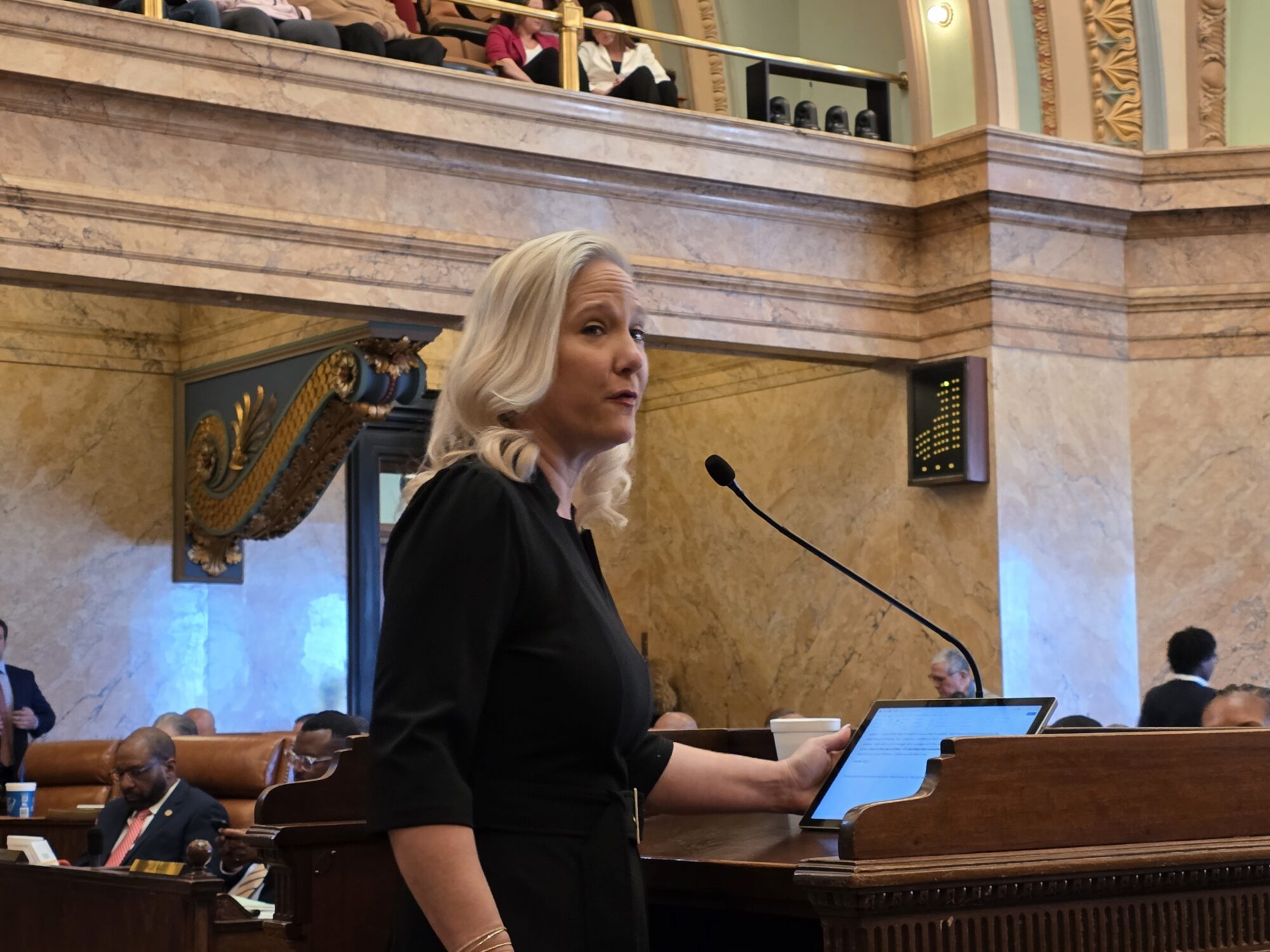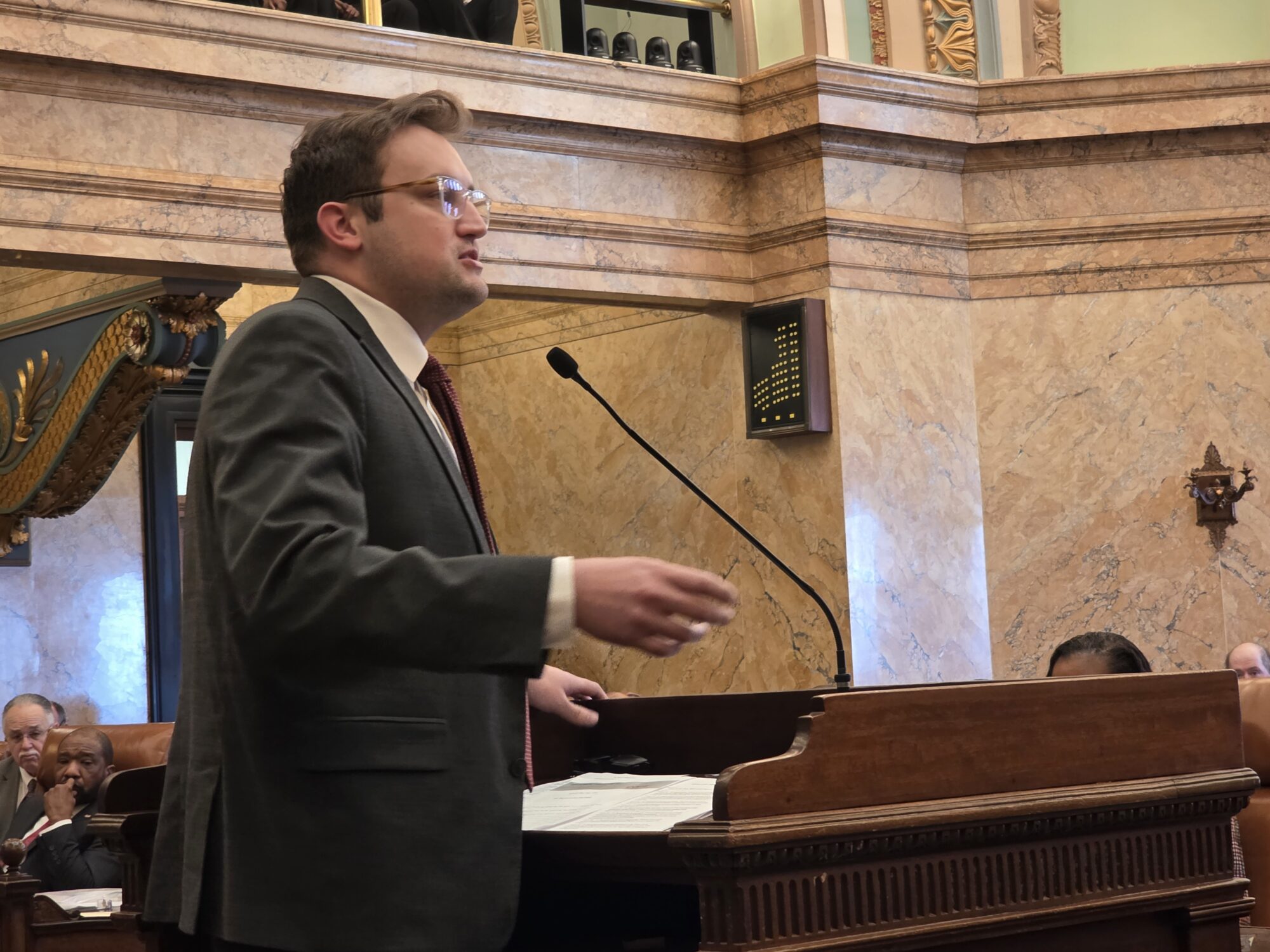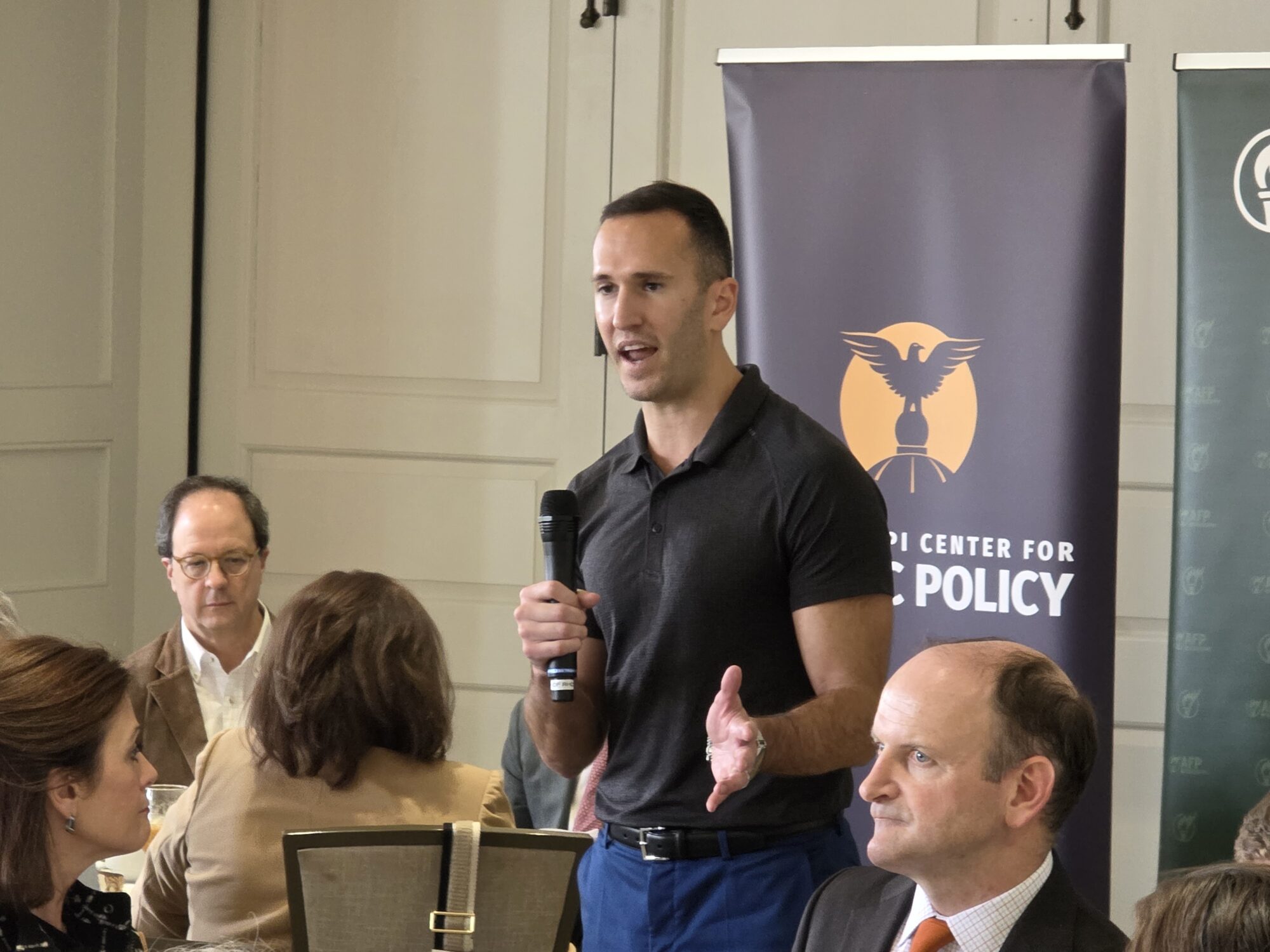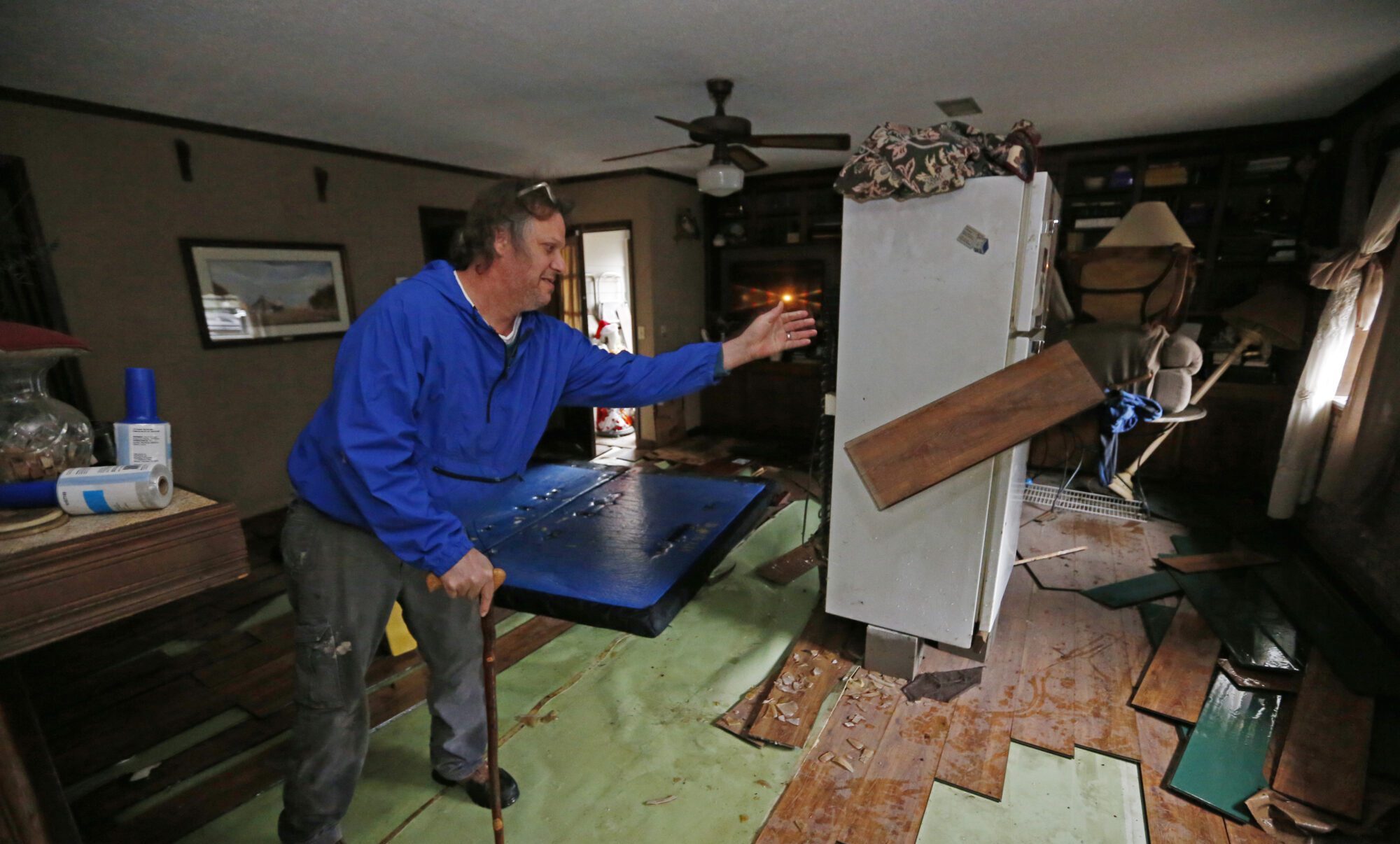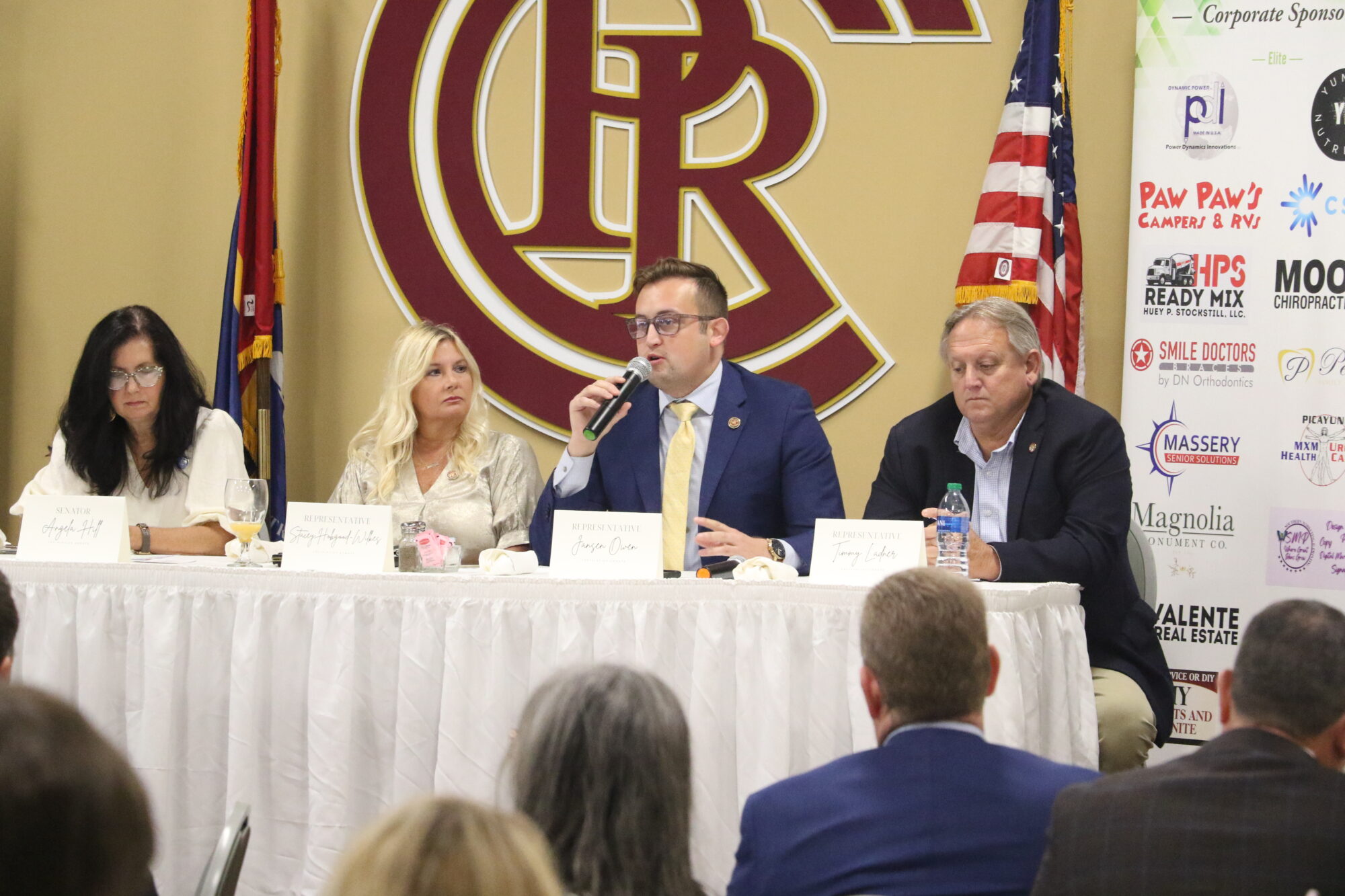
Pictured from left, Senator Angela Hill and Representatives Stacey Wilkes, Jansen Owen and Timmy Ladner provide updates during an event held at Pearl River Community College Tuesday morning, July 30, 2024. (Photo by Jeremy Pittari | Magnolia Tribune)
- State Senator Hill along with State Representatives Wilkes, Ladner and Owen highlight legislation passed in the 2024 session at PRCC forum.
Pearl River Community College hosted a legislative forum last week. State Senator Angela Hill (R) along with State Representatives Stacey Wilkes (R), Timmy Ladner (R) and Jansen Owen (R) shared successes from Mississippi legislation passed in 2024.
Lawmakers Unveil Success Stories from the Session
Education funding, sign language and workforce development
One of the more impactful bills this year was replacing the education funding formula known as MAEP. Lawmakers did away with the Mississippi Adequate Education Program formula in favor of the Mississippi Student Funding Formula.
Rep. Owen said eliminating MAEP was a priority for the House in 2024, noting that the process began with the introduction of the INSPIRE Act. However, legislators in the House had to go through five iterations to finally get a form of the bill passed in negotiations with the Senate.
“Ultimately, we brought it back to life a final time, we changed the name, it’s now the Mississippi Student Funding Formula,” Owen said. “It’s the first time in 30 years MAEP has been repealed and we have a new funding formula.”
READ MORE: New education funding formula signed into law, MAEP no more
The new weighted formula provides more money to school districts and addresses specific funding needs for students such as those in special education programs, those in high poverty areas, and English language learners, to name a few. The new formula provided an additional $240 million in funding for K-12 public schools in Mississippi.
Rep. Owen said that particular piece of Mississippi legislation passed in 2024 was just one part of a larger effort to increase public education funding.
“Just in that five-year period [since he took office], we have increased education funding by almost $1 billion,” Owen told those in attendance at the forum. “Between our teacher pay raises and this funding formula, we’re close to $1 billion in education spending increases.”
In the education arena, Senator Hill noted how proud she was to be able to pass legislation this year that allows sign language to fulfill a high school student’s foreign language requirement.
“I never dreamed that bill would get the kind of press that it did, but it’s the simplest things that people like,” Hill said.
READ MORE: Sign language now an option for Mississippi high school foreign language requirement
Senator Hill also touted a bill that provides tax credits to employers that sponsor skills training at a local community colleges.
EPA overreach
Rep. Ladner went on to note his work to address overreach from the federal Environmental Protection Agency (EPA). He said the EPA has overstepped its boundaries. As such, Ladner and State Senator Scott Delano (R) will hold hearings to explore ways to adjust how wetlands are defined in Mississippi.
The goal is to ensure wetland regulations are not a burden on citizens.
“I personally try to focus on government accountability all the time and when government oversteps, I like to be one of those guys who says, ‘Wait a minute,'” Ladner said.
Other bills discussed during the Pearl River legislative update dealt with emergency responders, protections for children online, and protections for women.
Emergency responder benefits, EMS expenses
Senator Hill spoke on a bill that provides an increase in emergency responder benefits. It allows police and fire departments to provide 30 days of salary to the family of a deceased emergency responder. Hill said the bill applies to coroners and deputy coroners as well.
“We also increased the death benefits for first responders that fall under those categories,” Senator Hill added.
New Mississippi public safety laws address squatted vehicles, driver’s education, first responder benefits – Magnolia Tribune
As part of Rep. Wilkes’ work on a task force to address EMS personnel shortages, legislation was drafted that allows ambulance companies to recoup expenses of responding to a call when the injured person declines or does not need to be transported to a hospital emergency room.
“The problem with that is the ambulances don’t get paid if they don’t transfer you,” Wilkes explained.
Even though the company still incurs the expense of paying for personnel, fuel and the medication used while treating that person, unless the ambulance took the injured person to the hospital, Wilkes said the patient is not required to pay. She believes collecting fees even though the person was not transported will provide more money for EMS personnel pay increases and help in recruitment efforts.
Rep. Wilkes added that the legislation also allows a patient to be transported to a clinic or doctor’s office if the injury is not severe enough for an emergency room.
“The insurance companies hated this bill,” Wilkes said.
Pharmacy Benefit Managers
Rep. Wilkes said she and other members of a recently formed committee in the House, the Select Committee on Prescription Drugs, are now looking into Pharmacy Benefit Managers or PBMs. Pharmacy Benefit Managers act as a middleman between the pharmaceutical companies and pharmacies to negotiate discounts or rebates and processing claims.
While PBMs once may have been beneficial for pharmacists and customers, Rep. Wilkes said a problem with the current system has become evident.
“Basically, PBMs are getting a lot of money,” Wilkes described. “They don’t have to show contracts, they don’t have to show rebates, so when the company or customer is supposed to be getting rebates, PBMs are keeping them.”
A bill she introduced last year to tackle the problem became so “watered down” as it moved through the legislative process, Wilkes said she decided to kill it.
Hearings will be held this summer to allow legislators to speak with PBMs, pharmacists and business owners. The hope is to craft legislation ahead of the 2025 session that would benefit small business owners and protect independent pharmacists.
Public safety legislation
In terms of public safety, the Pearl River County delegation spoke on the effort to protect children from sextortion through the Walker Montgomery Protecting Children Online Act. Senator Hill said the bill provided protections for young people being blackmailed by perpetrators and who threaten to release compromising photographs online.
Another piece of legislation that focuses on protecting children online forces social media companies to implement age verification methods. Rep. Owen said social media sites can provide young people with access to obscene material. Mandating age verification puts the companies in a position to be more involved in protecting the state’s children, he said.
“Now Google sued us, and we are currently in a lawsuit over that bill, but we suspect ultimately we will prevail,” Owen added.
READ MORE: Injunction halts Walker Montgomery Protecting Children Online Act from taking effect
Other crime-related bills were passed this year, one of which seeks to deter organized retail shoplifting involving several perpetrators.
“Whether or not you’re shoplifting or stealing, if you’re an accessory and you’re helping somebody, you’re driving the car, you’re looking out or whatever, you’re going to get a felony,” Hill described.
One new law that received much attention in the waning days of the session was the SAFER Act. It provides protections for women in the most vulnerable of spaces while defining sex-based terms such as woman, female, man, and male using biological sex.
“So, we’re not going to have people pretending to be females in some of these areas,” Senator Hill elaborated.
READ MORE: Legislation signed into law defining sexes, protecting single-sex spaces for women
Hill said she introduced similar legislation three years ago, but it didn’t make it to the Governor’s desk.
“But now we know just how important it was and should have been passed three years ago,” said Senator Hill.
Kratom was also a topic touched on by Rep. Wilkes. While there appears to be a “lack of appetite” to ban the substance as a state, Wilkes said she is working with the Mississippi Bureau of Narcotics to share example ordinances that can be used by city and county officials to ban kratom locally until a statewide ban can be imposed.
“This is just bad stuff, you don’t know what’s in it, and there’s been a lot of deaths and addictions,” Wilkes said.

